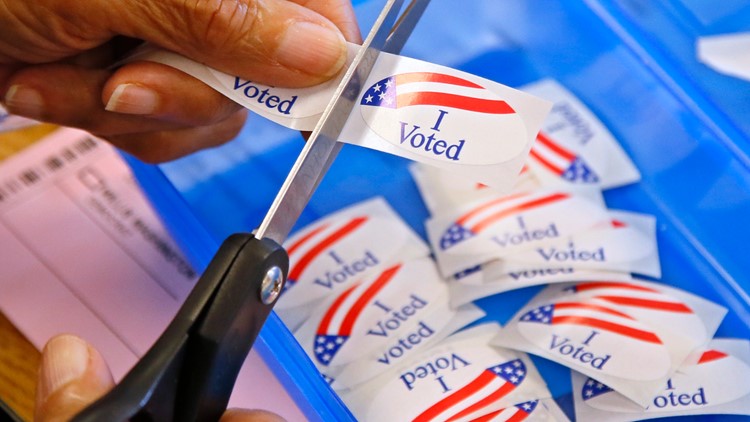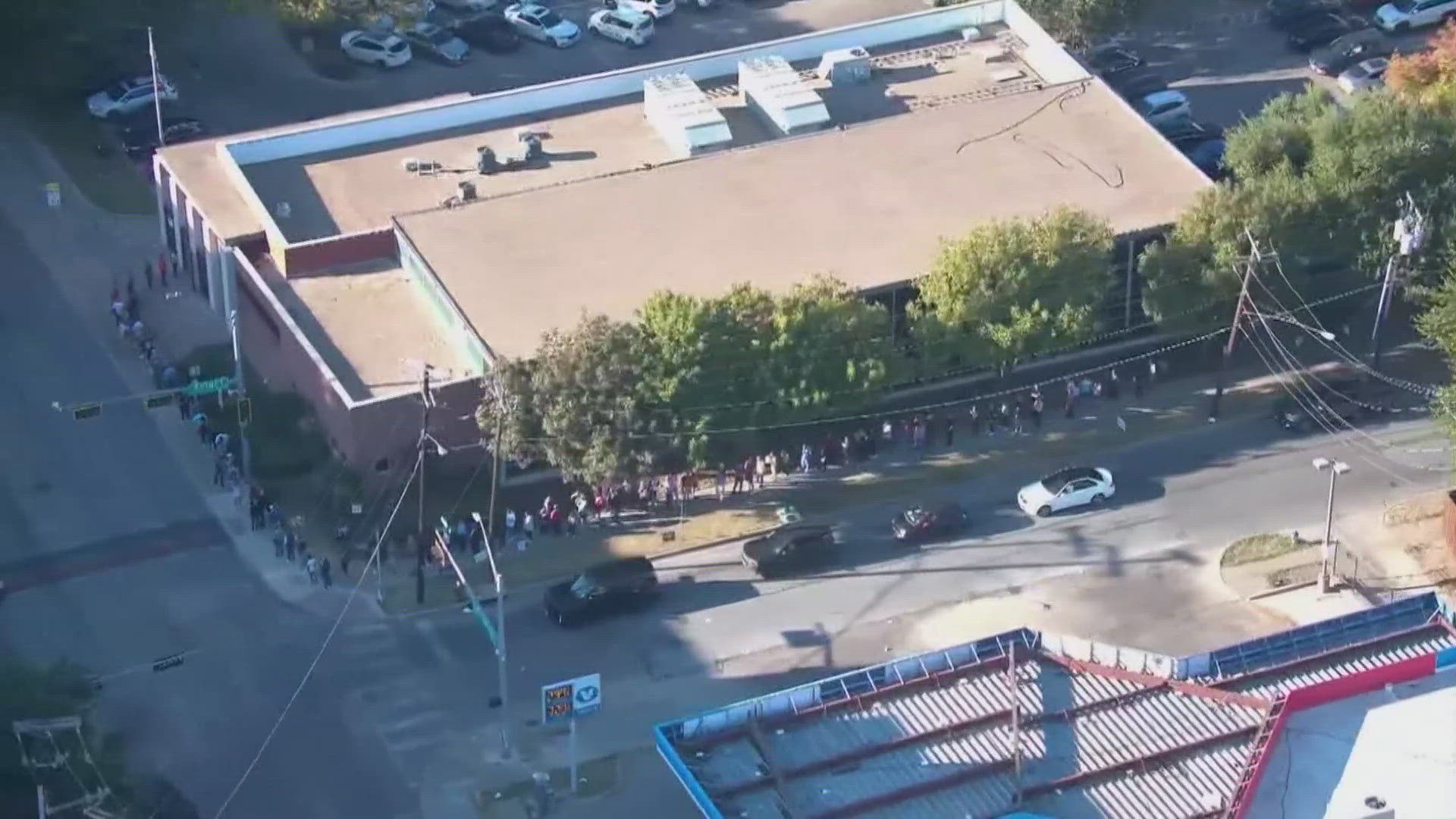DALLAS — Dallas City Council approved 21 propositions that will appear on the ballot when voters head to the polls this November.
Some of the larger propositions that will be considered include reform of marijuana enforcement, raises for city council members and the mayor, and the implementation of term limits for city council members and the mayor.
Here's a rundown of all 21 propositions:
Proposition No. 1: Retirement fund
This highly technical amendment affects the city employee retirement fund. Specifically Chapter 40A of the Dallas City Code, which covers the employees' retirement fund of the city, would be revised to provide amended terms and term limits of the board, modify board powers and duties, and specify details such as the current total obligation rate, the pension obligation bond credit rate for the fiscal year, and amended contribution amounts for city employees.
Proposition No. 2: City Charter preamble
This proposition proposes amending the City Charter by adding a preamble declaring the city to be "an equitable democracy, comprised of representatives that act to make the city fair, equitable, just, and safe for all residents."
Proposition No. 3: Salary increases
This would increase the annual salary of the Dallas mayor to $110,000 and the annual salaries of council members to $90,000 — from their current $60,000. Future salary increases would be automatically tied to inflation -- that is, be subject to a yearly adjustment equal to the year-over-year percentage increase in the local consumer price index.
Proposition No. 4: Election date
Elections for city council members would no longer be required to be held in May. This is a compromise amendment after a proposal to move the city election date from May to November did not garner enough council support. Instead, this opens the door for the city to change its election date by city ordinance down the line -- provided the legislature allows for it.
Proposition No. 5: Term limits
If approved, members of city council would have a maximum of four two-year terms and the mayor would have a maximum of two four-year terms.
Proposition No. 6: City secretary, auditor
The city council would be required to provide the city secretary and city auditor with employees.
Proposition No. 7: Redistricting Commission eligibility
This would add eligibility criteria for serving on the Dallas redistricting commission.
Proposition No. 8: Board requirements
This proposition broadens the ability of people living in Dallas to serve on boards like the redistricting commission, city plan commission, civil service board and park and recreation board. It removes the requirement for them to be citizens -- specifically they no longer must be registered to vote, be qualified voters or qualified taxpaying citizens.
Proposition No. 9: Petition signature collection
This would extend the deadline for petition signature collection from 60 days to 120 days and also reduce the number of signatures needed on a petition from 10% of qualified voters in Dallas to 5%.
Proposition No. 10: City board replacements
City Council would be allowed to replace city board and commission members prior to their completion of two-year terms if approved.
Proposition No. 11: City fund appropriations
Dallas City Charter would be amended to read that City Council shall make the final decision regarding use of city funds, and that instructions regarding the approval or adjustment of city employee wages would serve only as recommendations for their consideration.
Proposition No. 12: Inspector General
This would move the Office of Inspector General to report directly to the City Council. This proposal garnered support from the Dallas County Criminal District Attorney John Creuzot.
Proposition No. 13: Asserting no waiver of immunity
City Charter would be amended to assert that nothing in the charter is intended to waive the city's governmental immunity from suits, liability or damages.
Proposition No. 14: Authority over city manager
This would add a provision to City Charter clarifying that City Council has final authority over the appointment, removal and compensation of the city manager.
Proposition No. 15: Associate Municipal Judges
If approved, the appointment procedure for associate municipal judges would be amended stating they are appointed by city council, receive assignments from administrative judges and must Dallas residents within four months of date of appointment.
Proposition No. 16: Administrative Law Judge costs
The requirement that a city employee appealing their discharge or grade reduction to an administrative law judge pay half of the costs of the appeal hearing would be deleted if approved.
Proposition No. 17: Amendment language clarification
Various sections of the City Charter would be amended to conform to state law and city code, such as correcting terms and clarifying language.
Proposition No. 18: Marijuana
A new section would be added to the City Charter to prohibit the Dallas Police Department from making arrests or ticketing for marijuana possession or considering the smell of marijuana to be probable cause for search or seizure, unless as part of a violent felony or high priority narcotics felony investigation. It would also make enforcing Class A and Class B misdemeanor marijuana possession DPD's lowest enforcement priority. This proposal was citizen-driven and collected enough signatures that council had no choice but to put it on the ballot.
Proposition No. 19: Granting standing to residents
This proposition would allow any Dallas resident to sue to city to require it to comply with charter provisions, ordinances and state law, and would also waive the city's governmental immunity from suit and liabilities under the amendment. The latter part of the language appears to conflict with proposition No. 13 above. This proposal was citizen-driven and collected enough signatures that council had no choice but to put it on the ballot.
Proposition No. 20: Annual community survey
If approved, the city would conduct an annual community survey to be completed by a minimum of 1,400 residents, based on their satisfaction on quality of life issues. The results of this survey could result in the city manager earning additional pay based on performance (between 0% and 100% of their annual base salary) or it could result in the firing of the city manager. This proposal was citizen-driven and collected enough signatures that council had no choice but to put it on the ballot.
Proposition No. 21: Police, fire funding appropriation
City Council would be compelled to appropriate at least 50% annual revenue exceeding the total annual revenue of the past year to fund the Dallas Police and Fire Pension. Any monies remaining of that 50% would be used to increase the starting compensation of the DPD and raise the number of officers by about 900 officers to at least 4,000 total. This proposal was citizen-driven and collected enough signatures that council had no choice but to put it on the ballot. It has garnered opposition from DPD Chief Eddie Garcia who said the city is aiming to hire 250 more officers in the coming year -- and would have difficulty recruiting and training any more than that.



